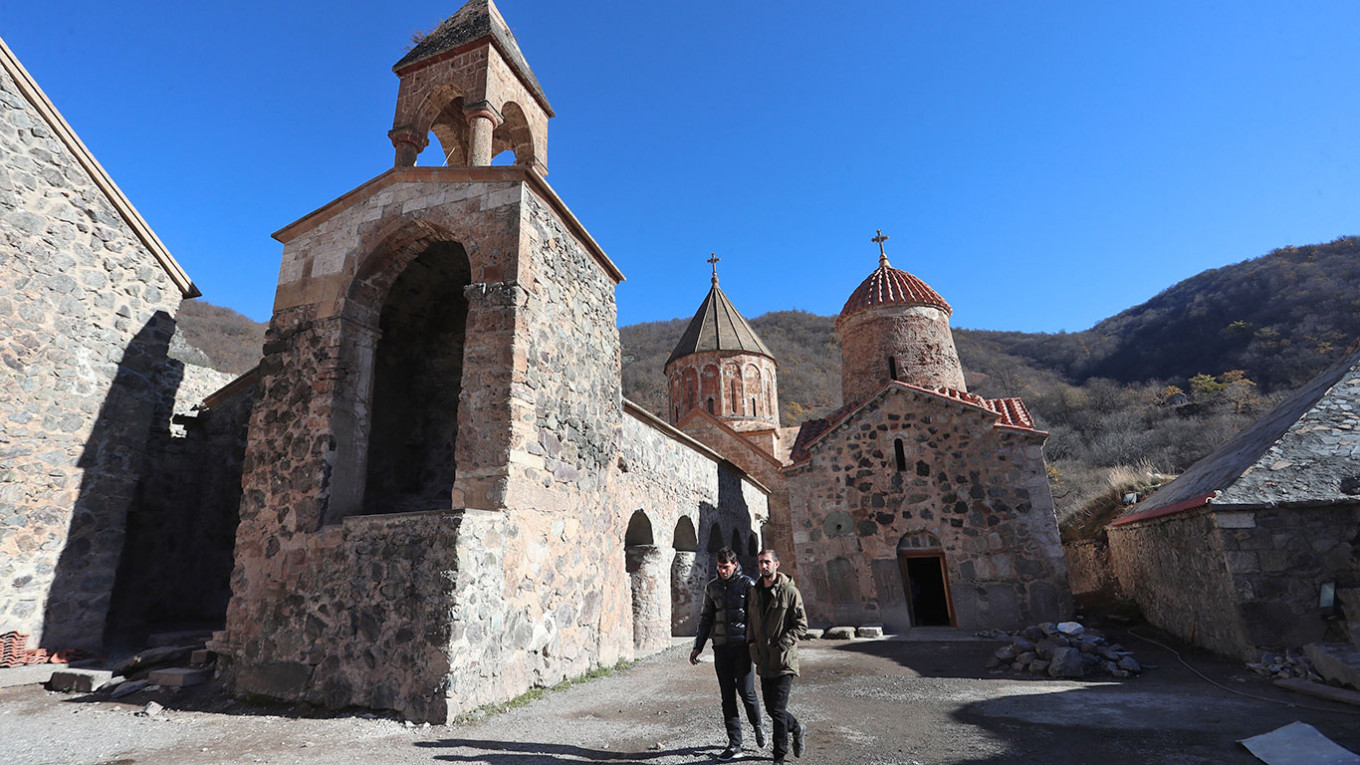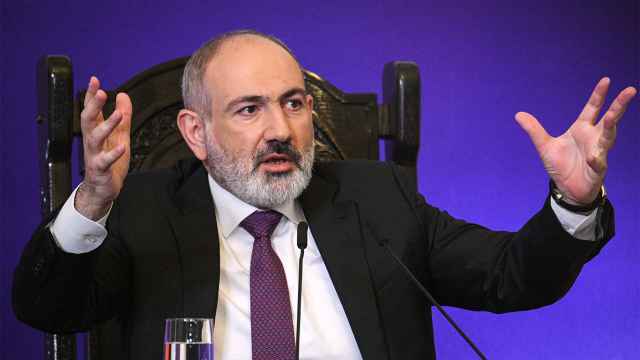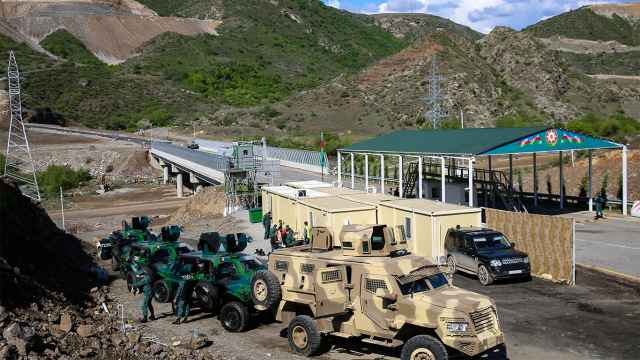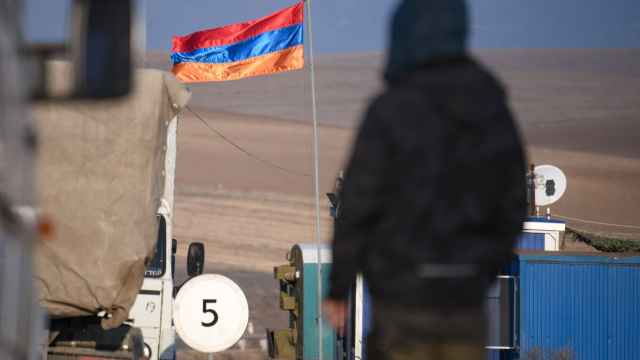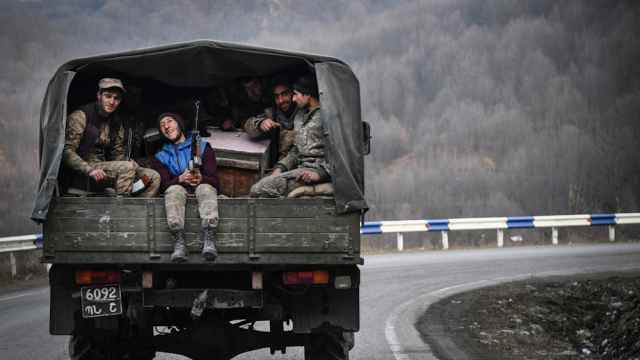Azerbaijan’s Ministry of Culture has responded to controversy resulting from its earlier announcement that it intended to erase Armenian inscriptions from churches located in territories the country reclaimed as a result of the 2020 war against Armenia.
On February 7, the ministry published a statement addressing what it called "reports circulated by some biased foreign mass media outlets over the past few days." It emphasized that "Azerbaijan has always been respectful of its historical and cultural heritage, regardless of religious and ethnic origin."
Four days earlier, Minister of Culture Anar Karimov told a press briefing that it would be forming a working group tasked with removing “the fictitious traces written by Armenians on Albanian religious temples.”
That referred to a theory, which has become prominent in Azerbaijan but is dismissed by mainstream historians, that Armenian inscriptions in churches on Azerbaijani territory were later additions to churches built under Caucasian Albania, an ancient Christian kingdom that ruled the territory that is today Azerbaijan.
The new statement reaffirmed that "a working group has been set up to study this heritage" and that "[s]hould any falsifications be identified, they will be documented with the participation of international experts and presented to the international community." But it did not mention removing any Armenian traces, as Karimov’s earlier announcement did.
That news had attracted widespread criticism.
"We are deeply concerned by Azerbaijan's plans to remove Armenian Apostolic inscriptions from churches. We urge the government to preserve and protect places of worship and other religious and cultural sites," the U.S. Commission on International Religious Freedom tweeted, quoting its chair, Nadine Maenza.
TV Zvezda, a news outlet run by Russia’s Defense Ministry, published a piece on February 8 in which it pointedly referred to the Dadivank Monastery, in Azerbaijan’s Kelbajar region, as "one of the greatest monasteries of medieval Armenia." A 2,000-strong Russian peacekeeping contingent is currently stationed in Karabakh. In earlier comments, Karimov had claimed that the monastery was Albanian.
After an initial period of conspicuous silence, Armenia’s Foreign Ministry issued a statement on February 8 condemning Karimov’s comments: "It once again demonstrates the fact that the cases of vandalism and destruction of the Armenian historical, cultural and religious heritage in Nagorno-Karabakh during the 44-day war and the following period, are deliberate and pre-planned, and are part of the policy of annihilating Nagorno-Karabakh’s indigenous Armenian population."
The announcement occasioned widespread public anger among Armenians. “It's time to take the government of Azerbaijan at its word when it says it intends to erase all traces of Armenians beginning with their churches and ancient heritage sites,” wrote Elyse Semerdjian, a professor of Middle Eastern history at Whitman College, on Twitter.
In Azerbaijan, meanwhile, there has been near silence around the news. Pro-government media, which in comparable cases often actively publicizes plans announced by the government, barely covered the announcement or responses to criticism of it. Commentators and activists, pro-government or otherwise, devoted little attention to it.
A rare exception was Javid Agha, a social media commentator who researches Caucasian Albanian heritage in Azerbaijan, speculated that the plan may have been motivated by corruption, which is endemic in Azerbaijan.
“There is no logic behind it. No tourist will come to see barren churches, Azerbaijanis won’t care about it, nobody will applaud the government for it from outside. Just another excuse to write some checks,” Agha tweeted.
A Message from The Moscow Times:
Dear readers,
We are facing unprecedented challenges. Russia's Prosecutor General's Office has designated The Moscow Times as an "undesirable" organization, criminalizing our work and putting our staff at risk of prosecution. This follows our earlier unjust labeling as a "foreign agent."
These actions are direct attempts to silence independent journalism in Russia. The authorities claim our work "discredits the decisions of the Russian leadership." We see things differently: we strive to provide accurate, unbiased reporting on Russia.
We, the journalists of The Moscow Times, refuse to be silenced. But to continue our work, we need your help.
Your support, no matter how small, makes a world of difference. If you can, please support us monthly starting from just $2. It's quick to set up, and every contribution makes a significant impact.
By supporting The Moscow Times, you're defending open, independent journalism in the face of repression. Thank you for standing with us.
Remind me later.


